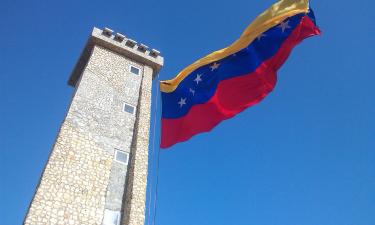Dmitry Medvedev: US-Russia relationship very close to 1962 Caribbean crisis
Dmitry Medvedev, Deputy Chairman of the Russian Security Council, said that the relations between Moscow and Washington have returned to the era of the Cold War.
“During the recent years, the relations between Russia and the United States have actually moved from rivalry to confrontation. In fact, they have returned to the era of the Cold War. The sanctions pressure, threats, conflict confrontation, protection of selfish interests - all this plunges the world into a state of permanent instability. In such a situation, any wrong step, lack of patience and strategic understanding of the weight of every word can plunge not only two separate countries, but the whole world into the abyss of most severe problems, putting it in front of the threat of a direct military confrontation," Medvedev believes.
Medvedev reminded of the 1962 Caribbean crisis and noted that it was the leaders of the two superpowers that saved the world from destruction, who could preserve sober assessment and recognized the "wisdom of a compromise."
"There was an equal dialogue between the USSR and the United States, which excluded the language of threats and ultimatums," Medvedev said, adding that after the resolution of the Cuban missile crisis, the two countries came to realize that cooperation in resolving international problems was better than confrontation.
"The current state of affairs is somewhat different today: the United States has spiralled into volatile foreign policies. This was manifested, inter alia, in the rejection of the nuclear deal with Iran, in the pull out from the Open Skies Treaty, in a number of other agreements, and currently - in the rhetoric of the new president," Medvedev stressed.
According to him, the instability of Washington's foreign policy is caused by both internal reasons and the decline of the USA's authority as the leader of the Western world. After the collapse of the USSR, the United States had had no equal rival for as many as 15 years and simply lost the habit of having an equal dialogue.
“The new US administration, restoring its position of the world ruler and defender of the collective West (while convincing itself of this), does not have the strength of mind to admit that someone in the world can have comparable infrastructural capabilities and military-political potential. For example, China or Russia," Medvedev wrote.
He urged the two countries to realize the need for an equal dialogue and the need to make concessions, "to abandon the language of ultimatums and rudeness that drive the dialogue into the grave."
“That is why the rhetoric of those simple words "Russia will pay the price", although it does sound very American, is leading the countries down the blind alley," Medvedev concluded.
- A new round of tensions in the relations between Moscow and Washington began on April 15, when the United States announced new sanctions against Russian citizens and companies. In addition, additional sectoral sanctions were imposed on Russian federal loan bonds (OFZ).
- The same day, Washington announced the expulsion of ten Russian diplomats having claimed that there were representatives of the Russian special services working in the diplomatic mission.
- The next day, April 16, Putin's aide Yuri Ushakov recommended US Ambassador John Sullivan should return to Washington for consultations.
- Afterwards, the Russian Foreign Ministry announced ten employees of the US Embassy in Russia persona non grata; American diplomats were ordered to leave the country by the end of May 21.
- Russia is working on responsive measures.
Subscribe to Pravda.Ru Telegram channel, Facebook, RSS!





